 LITCHFIELD — The sun is just peeking over the roof line, the dooryard is muddy from the first spring melt and inside the Black Crow Bakery the workday is well underway.
LITCHFIELD — The sun is just peeking over the roof line, the dooryard is muddy from the first spring melt and inside the Black Crow Bakery the workday is well underway.
Standing on the black-and-white tile floor, amid pallets piled with 50-pound bags of flour, a large commercial mixer chugs through the opening act of an age-old process that aims for a satisfying finale before sunset.
A hooked metal arm tugs and twists the pale mass forming in the 60-quart bowl. Every few turns, the arm hits the side of the bowl, banging out an easy, syncopated rhythm that’s familiar to Mark Mickalide.
Head down, concentrating, Mickalide hears something in the sound, picks up a half-empty brown sack of flour and shakes some into the bowl. He does this several times, looking for the perfect texture and resistance in the dough.
“I know what it needs,” Mickalide says with confidence and typical brevity.
Twenty-three years into making bread at his rustic 1780 farmhouse on Plains Road, Mickalide has pretty much figured out a recipe for the good life. And he willingly shares it.
In a wood-fired brick oven stoked with local maple and oak, Mickalide bakes 750 loaves each week of bran-flecked Tuscan, Jewish rye, Anadama and other artisanal breads that are sold at the bakery and at eight stores from Portland to Damariscotta to Waterville. He regularly gets calls from others who want to sell his bread, but he declines, having learned in the past that working more didn’t make him happy.
Mickalide, 59, didn’t take the easy route to get here. His early journey from philosophy major to chiropractor eventually led him back to his family’s bread-making heritage and the trade his Greek grandfather plied when he first came to the United States.
With his wife, Tinker, Mickalide has built a comfortable career and lifestyle making one of the most basic and spiritual foods, a subject of Bible verses and ancient poems that links him to bakers across the globe and through the millennia.
“The bread I make is not significantly different from a loaf of bread that someone made back in Egypt,” Mickalide says. “It’s about as close to the earliest food as you’re gonna get.”
• • • • •
Mickalide is in the bakery before 7 each morning. It occupies a small ell or shed area that connects his white clapboard farmhouse to a sagging red barn. The first thing he does is start a fire in the brick oven that takes up one wall. He had it built like the one his immigrant grandfather used when he came to Lewiston at the start of the last century.
“It seemed close to my idea of simplicity, my idea of tradition and carrying on after my grandfather,” Mickalide says. “People say, ‘I’d love to have a brick oven,’ but there are days when I would like to be able to just turn it on.”
Baking in a brick oven is a lot of work. Mickalide burns hardwoods that a neighbor harvests using a horse and delivers with a tractor. He kindles and feeds the fire with sticks, household paper waste, dried dough scrapings and old crusts of bread.
He moves the fire around occasionally, making sure the belly of the oven is heated evenly. He doesn’t want any hot spots. The oven cooks with radiant heat and he’s looking for a nice, even 400 degrees.
“I know it’s ready when the bricks are all white,” he says. “There’s a certain quality to the whiteness. There’s also a certain smell. The bricks have a certain smell at a certain temperature.”
He checks the oven, opening the cast-iron door to view the cavern inside. It’s not quite there yet, so he heads out into the barn and stokes the fire through the oven’s side door.
“It took a couple years before it felt like I was running the oven and not the oven running me,” he says. “I still have the ‘Aw, s—‘ moments when the temperature isn’t quite right. It’ll cook the bread, but it doesn’t color it and it tends to dry it out.”
By 10 a.m., the fire is out and the course is set.
• • • • •
Mickalide grew up in Lewiston, in a suburban neighborhood lined with ranches and capes. After graduating from Lewiston High School in 1974, he attended Bates College for a while, then spent some time in Paris studying Eastern philosophy at the Sorbonne. He returned to graduate from the University of Maine with a not-so-lucrative philosophy degree.
To make a living, he worked as a chef in Bar Harbor for a few years, mining cooking skills passed down by the men in his family.
“My first job at 13 was as a dishwasher at a summer camp,” Mickalide says. “I’ve always been comfortable in kitchens.”
His Greek grandfather, Anastasia, immigrated from Albania to Lewiston around 1910 and built an apartment house near the busy rail yard and the Greek Orthodox church. He installed a brick oven in the basement and started turning out bread, something he was famous for in the old country.
“According to my aunt, my grandfather was famous enough in Albania that there was a little song about Anastasia the baker,” Mickalide says.
Soon, his grandfather got married, started a family and leased the basement bakery to an Italian family. He turned to making candy, opened a store and a restaurant on the first floor and rented rooms upstairs to Greek priests.
Mickalide’s father, Harry, owned a few bowling alleys and restaurants in Lewiston and Auburn, including the Auburn Lanes.
“The bread baking skipped a generation, but my father definitely was a cooking presence in my life,” Mickalide says.
• • • • •
The air in the Black Crow Bakery is ripe with the earthy scent of yeast, so much so it nearly overpowers the sharper wood smoke.
But this is not your mother’s Fleischmann’s. Along with water, salt and freshly milled grains, some of them grown in Maine, Mickalide uses a natural slow-rising yeast starter that he began using 30 years ago with a mashed potato in water. Fed with regular infusions of flour and water, the sourdough starter is the basis of every loaf he makes, and the yeast it produces is everywhere.
“It’s in the air. It’s on every surface. The environment is just impregnated with yeast,” Mickalide says.
Flour is everywhere, too. A fine gray dust clings to many surfaces in the bakery, from the white tiled walls to the pink insulation tucked in the frames of drafty old windows. Even the black beret Mickalide wears on his head and the lavender bandanna around his neck. He pulls the cloth up over his nose and mouth whenever he’s tossing flour around.
“To prevent white lung,” he says, referring to the asthma-like condition that some bakers get.
When Tinker Mickalide returns from her early morning delivery route, she grabs a broom and starts sweeping.
“I always tell people,” she says, “if you want to have a bakery, you better like sweeping, ’cause you do a lot of it.”
• • • • •
Mark and Tinker Mickalide met while working together in Bar Harbor. She was a waitress and a student at the College of the Atlantic. Her petite stature and bubbly nature complemented his taller frame and calm reserve. He immediately impressed her with his cooking skills, and his love of bread. When her family made a meal of steak and salad, he asked for bread.
“I grew up in California,” she says. “We almost never had bread with our meals. Mark was a kind of revelation to me.”
But he hadn’t heard his true calling yet, so he left Bar Harbor and enrolled Palmer College of Chiropractic in Iowa.
“I knew the market for philosophers was pretty weak, so I had taken a lot of science courses (at UMaine), thinking I might one day become a doctor.” He still didn’t have enough science courses to get into medical school, “but I had this notion that being a chiropractor was like being a hippie doctor.”
It wasn’t. He hated being a chiropractor from the start, but he thought it might get better. “I decided to give it five years,” he says.
The joy never came, even after he opened his own practice in Lisbon Falls.
“I didn’t like how much I had to beat the bushes for patients,” he says. “I didn’t like the rap I had to give people. I didn’t like that if a guy came in with a hot disk, he probably was going to leave the same way. I hated not being able to really help some people. If somebody calls me now and says, ‘I need a half-dozen loaves of bread,’ I know I’m going to be able to do it.”
When the trial period ended, he sold the practice for $30,000, putting himself and his wife, who ran his office, out of work. Their son, Harry, was 6 months old.
• • • • •
By late morning, large mounds of dough are resting and rising in big plastic tubs. Mickalide heads out to run some errands, pays his property taxes at the town office, and returns home to have lunch and take a nap.
There are breathing spaces throughout the baking process, time spent cleaning up, taking orders, chatting with customers, reading a book or playing bridge online. In between baking cookies and filling her other duties as bakery vice president, his wife feeds the chickens and goats and does other household chores. In the warmer months, there’s about an acre of gardens to weed and water, and repairs to be made on a 235-year-old house.
“As a lifestyle, it works well,” Mark Mickalide says.
It’s a lifestyle he discovered thanks to a friend.
To make ends meet after selling his chiropractic practice, Mickalide found himself back in the kitchen, occasionally catering special events. When the $30,000 started to run out, he began looking for a more dependable source of income.
“I was down to my last jug of quarters,” he says. “I was making some bread for catering jobs and a friend said, ‘If you made bread, I’d buy two loaves a week.’ A light bulb went off that this was a good thing to do.”
Mickalide baked some of his Tuscan bread and drove south, dropping off loaves at the Micucci Grocery Co. in Portland, Morning Glory Natural Foods in Brunswick and a few other smaller food stores. He left his name and number at each stop. By the time he got home, there were several messages on his answering machine from people who wanted to sell his bread.
He thought, “This is gonna work.”
The business took off quickly. He set up a more serious baking operation in the ell of the farmhouse. He bought a used pizza oven and lined it with soapstone tiles. Then he had the brick oven built off the ell, in part of the barn.
Within five years, he had 24 accounts and nine employees. It was too much.
“By that time, it felt like I was chasing my tail all the time and not getting anywhere,” he says.
So, he started cutting back. Eventually, it was just him, his wife and their son, who’s now 24 and studying for his doctorate in physics at the University of Illinois at Urbana-Champaign.
“I put him on the payroll when he was 8, stacking wood,” Mickalide says. “He still does it when he’s home.”
Now, with only the couple at the helm, bakery customers usually help themselves, selecting a loaf from the open shelves, putting it in a brown paper bag and leaving $4 in a worn metal tin.
“So far, the honor system is working,” Mickalide says. “If I had to pay somebody to stand here, it wouldn’t be feasible.”
• • • • •
Despite his meandering career path, Mickalide still has the heart of a philosopher.
His daily routine has a monastic quality to it – waking early, working mostly alone, and minding the natural processes of the bricks warming, the dough rising and the sun keeping time as it moves through the sky. All of it ties him to his ancestors, to the earth, and to his faith, especially when he occasionally bakes bread for services at Holy Trinity Greek Orthodox Church in Lewiston. He likens the experience to the mystical Prayer of the Heart, first described by St. Paul the Apostle.
“It’s work with an empty-headedness to it,” Mickalide says. “There’s a thing in Greek orthodoxy that if you pray constantly, you can reach a point of reverberation of the heart where you become the prayer. That’s more of what baking is to me.”
Still, amid the Zenlike bread making, the Black Crow Bakery is a business, and Mickalide treats it as such. When customers venture up the rickety wooden stairs, through the old door that’s hard to close, he stops to talk with each one. Many are neighbors. Not all of them are chatty. Most have something to say about the weather, or the latest political intrigue in town, or the variety of bread they’re looking for. He aims to please.
“People always say, ‘It must be nice to be your own boss.’ Well, it’s not really like that,” he says. “Because all of a sudden, everyone who comes through the door is your boss.”
• • • • •
The bakery starts humming again around 1 p.m. Mark and Tinker haul out the dough and start shaping the different varieties in loaf pans and on baking sheets. French country baguettes. Round peasant boules. Herbed loaves dotted with Kalamata olives.
Though concerns about calories, carbohydrates and gluten have posed occasional threats to his livelihood, Mickalide still loves the product he makes.
“People ask me if I get sick of it,” he says. “How do you get sick of bread? That would be like getting sick of cold water on a hot day. When I’m hungry for supper, I’m just as hungry for bread as I was the first day I baked a loaf, and I eat the better part of a loaf every day.”
After the loaves rise a bit more, Mickalide grabs a utility light that hangs near the oven and opens the door. Now cleared of coals, the bricks look and smell perfect. He slashes the tops of the loaves, which helps them rise more evenly while baking, and starts sliding them into the oven. It holds about 50 loaves. He’ll bake three batches this afternoon.
He moves the loaves deftly using a peel – a large, flat wooden paddle with a 6-foot-long handle that reaches the depths of the oven. Once the loaves are arranged, he grabs a hose and sprays water inside the oven and across the bread. The steam will keep the crust from forming too quickly, again, to get maximum rise while baking.
The work is fast and arduous, but Mickalide doesn’t break a sweat.
“I’d like to do it at least 10 more years, you know, bump up against 70,” he says. “But I wouldn’t be surprised if I get there and just keep going ’cause it’s not that hard. When I take a vacation now, I find it hard to find things to do. I miss it and I’m ready to come back.”
A half-hour later, Mickalide grabs the utility light again, opens the oven door and peeks inside. The scent is intoxicating. The loaves are a beautiful light brown.
He pushes the peel into the oven and pulls out the first few loaves. He grabs one, feeling the weight. He taps the bottom, listening for the sound that could answer his daylong prayer and set his mood for the remainder of the evening. He smiles.
“Today’s a pretty good mood.”
Send questions/comments to the editors.


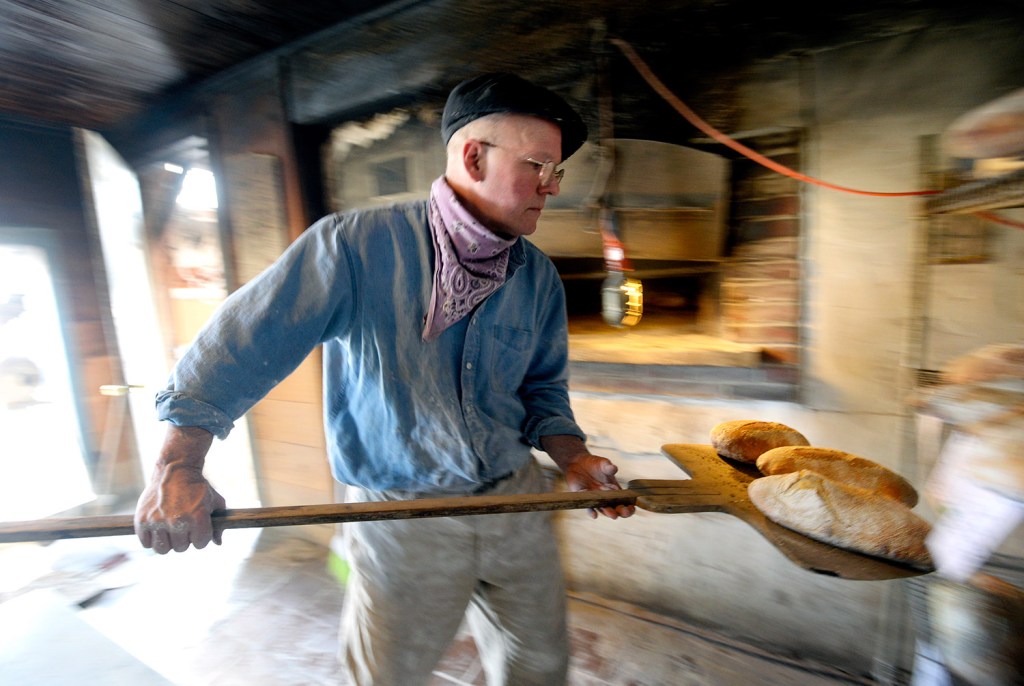

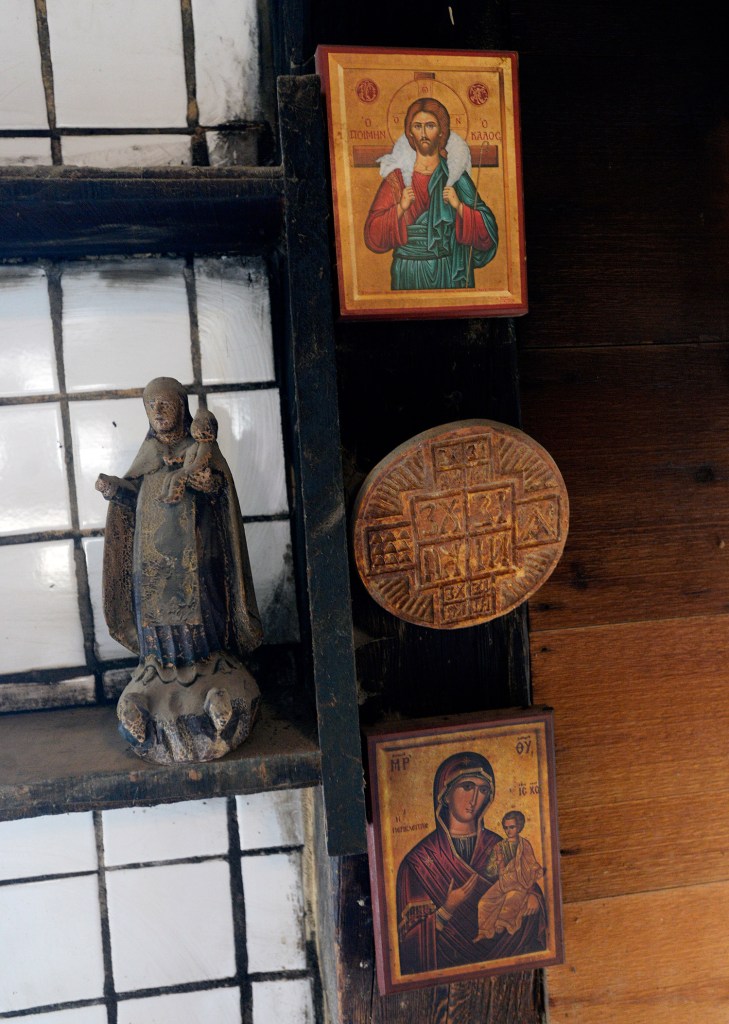
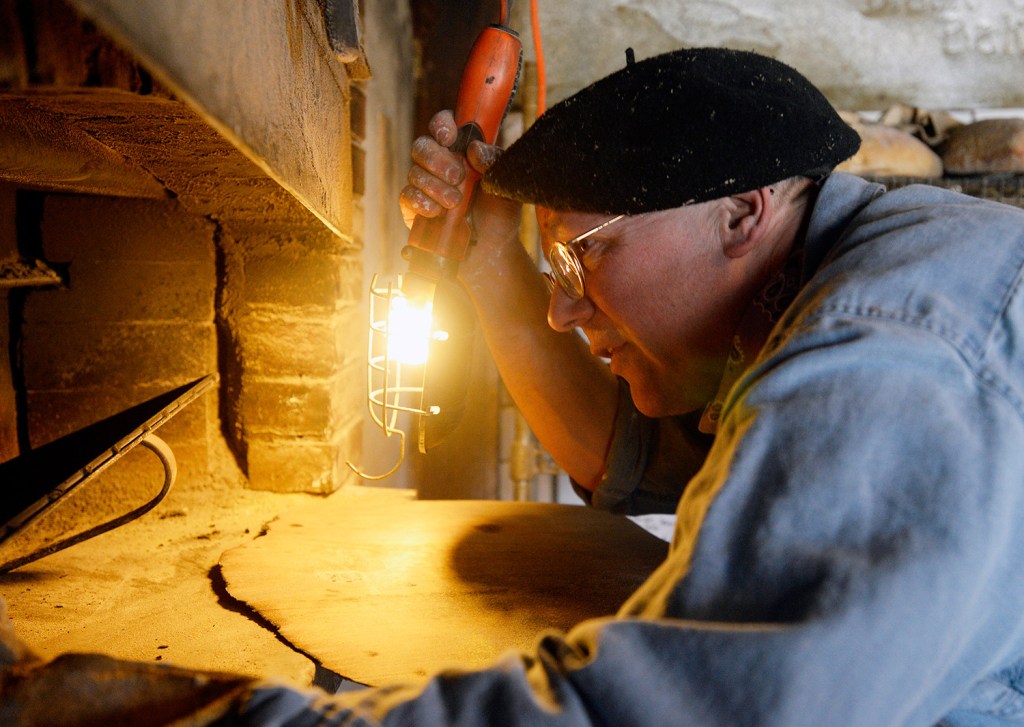
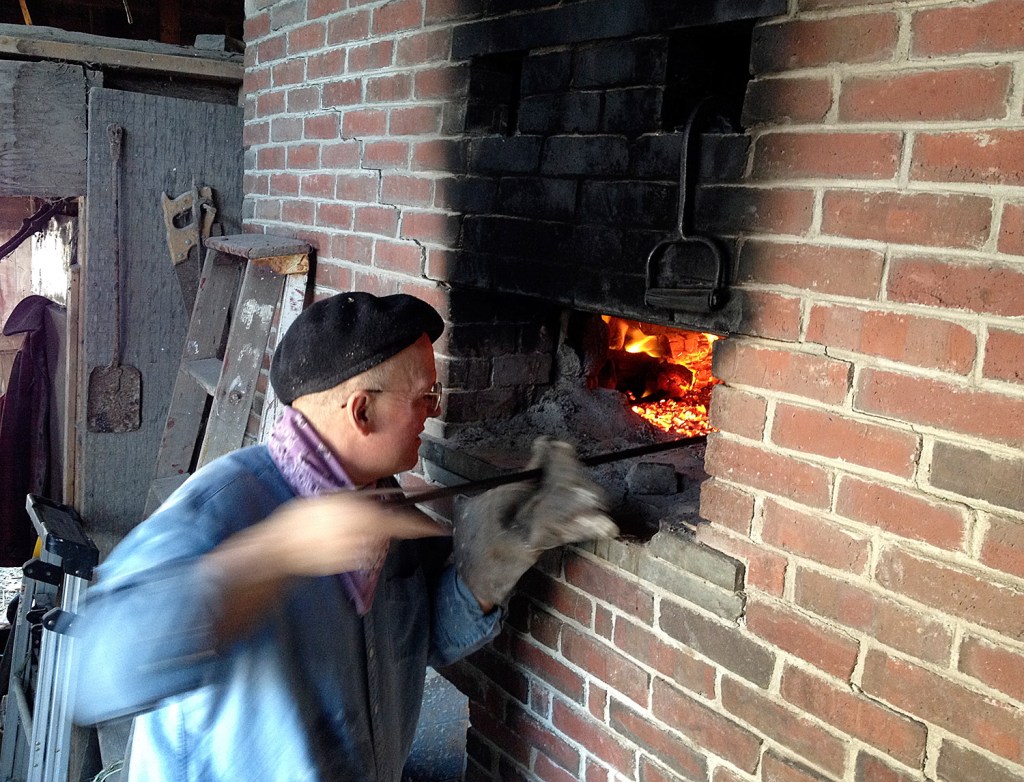
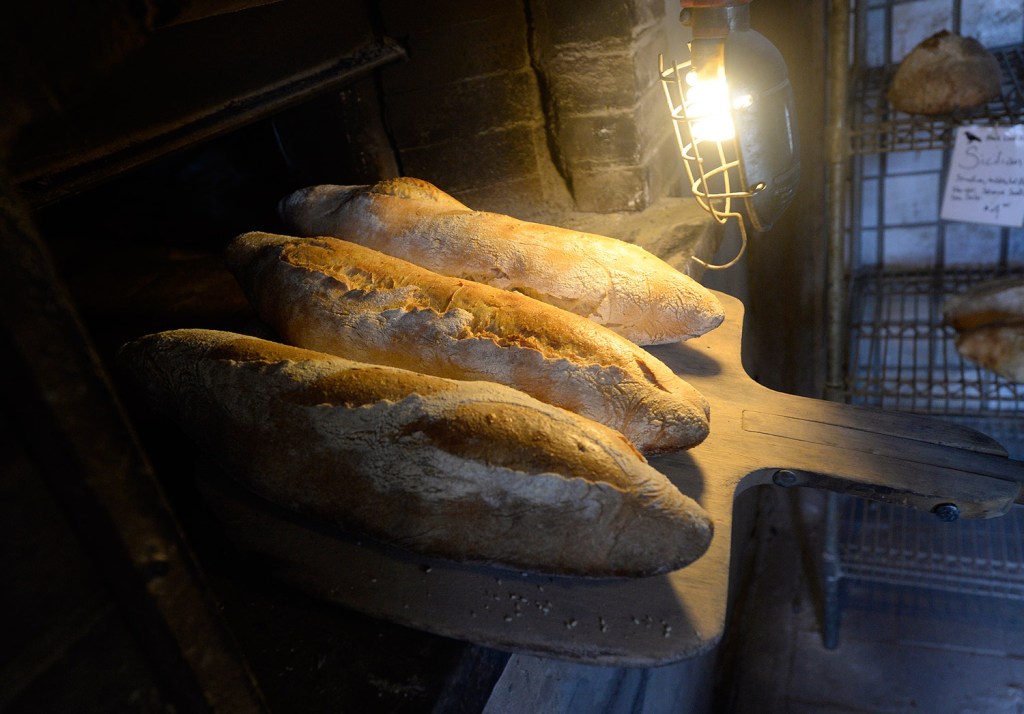


Comments are no longer available on this story